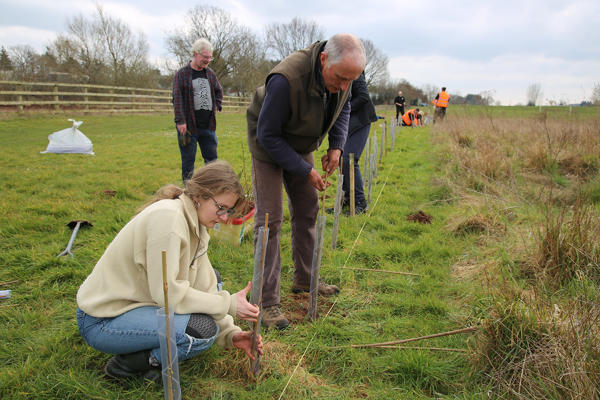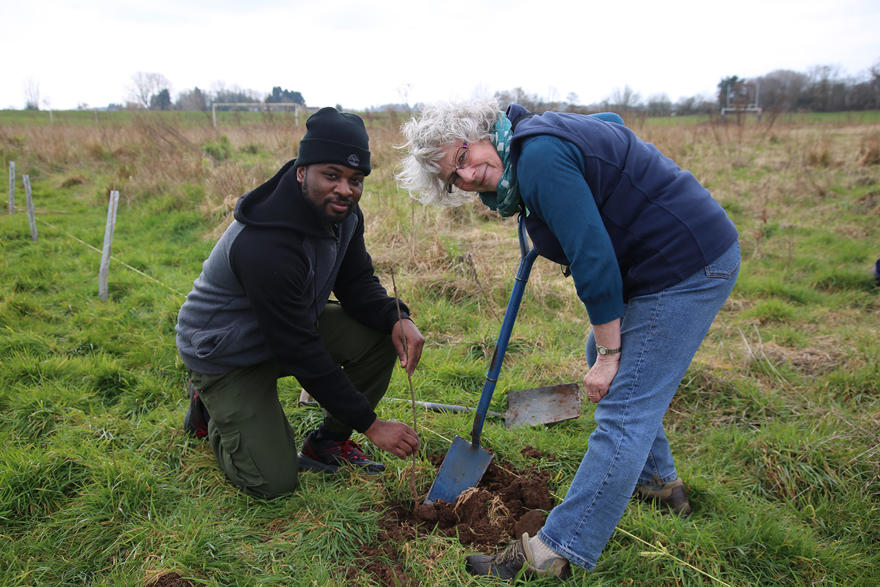The University of Worcester has been shortlisted for a national sustainability award, recognising its efforts to encourage biodiversity and support nature on campus.
 Volunteers planting the hedgerow down at the University of Worcester’s Lakeside Campus, a joint project between the University and the Worcester and Malvern RSPB group. Final picture shows swift boxes installed on University halls of residence.
Volunteers planting the hedgerow down at the University of Worcester’s Lakeside Campus, a joint project between the University and the Worcester and Malvern RSPB group. Final picture shows swift boxes installed on University halls of residence.
It has been named a finalist in the Nature Positive category of the Green Gown Awards for improving natural habitats and increasing the variety of animals and plants across its campuses, work which spans the past 15 years.
Dr Kate Ashbrook, Senior Lecturer in Biological Sciences at the University of Worcester and chair of the University’s Biodiversity Steering Group, said: “As a university, we are always striving to make a difference both in our teaching and research, but also in other ways, particularly our commitment to sustainability. Whether that’s by equipping students with the knowledge to make a positive impact or leading by example through our own sustainability initiatives, this work matters.
“Our biodiversity programme has transformed University land into green infrastructure. Today, over 10 per cent of our campus grounds are managed for conservation, supporting air quality and providing vital habitats for declining species, such as invertebrates and birds. It’s great to see these efforts recognised.”

The Green Gown Awards recognise exceptional sustainability initiatives by universities and colleges. The Nature Positive category recognises institutions actively promoting nature through their operations, teaching, research and in partnership with local communities. Winners will be announced in November.
Biodiversity has been a strategic priority at the University of Worcester since 2009. Initiatives include sowing wildflower meadows and planting woodland flora on campus. The University was an inaugural signatory to the global Nature Positive Universities Alliance, pledging in 2022 to promote nature on its campuses, in its supply chains and within its cities and communities, with actions including setting targets and monitoring progress.
A key project saw the University working with the RSPB Worcester & Malvern group in 2021 to transform three hectares of former sports fields at the University’s Lakeside Campus into a rich habitat for farmland birds, by rewilding grassland and sowing winter birdseed crops. This site now supports red-listed farmland birds such as linnets, with monthly surveys showing increased abundance. Earlier this year, volunteers planted a further 450 metres of hedgerow, incorporating traditional fruit tree species, to enhance the site and provide shelter for the birds.

Numerous bird and bat boxes have been installed, most recently a series of swift nest boxes at the City Campus halls of residence in March this year.
The University also launched the Campus Conservation Crew, a volunteer group made up of students, staff and members of the local community working together on practical conservation tasks across the campuses. In 2024, it introduced an iNaturalist biodiversity recording project, which has improved biological monitoring and increased awareness of campus biodiversity.
The University has a long-standing record on sustainability and was awarded Sustainability Institution of the Year at the 2019 Green Gown Awards, going on to be Globally Highly Commended at the International Green Gown Awards, at the United Nations in New York.
The University has been consistently ranked among the most sustainable institutions in the Country for more than a decade by the People and Planet League. In 2018, it became one of the first universities to sign the United Nations Sustainable Development Goals Accord, pledging to work towards a more sustainable future. The University was also among the first to declare a climate emergency, and to commit to a net-zero carbon target by 2030 for both direct and indirect carbon emissions.